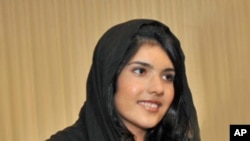The young woman whose striking, disfigured face became a symbol of the Afghan war when her picture made the cover of America's TIME magazine is entering a new stage in her recovery in the United States. But Bibi Aisha's recovery, like the conflict in her homeland, is taking longer than expected.
Bibi Aisha came to the U.S. from Afghanistan three months ago to undergo reconstructive surgery on her nose. Or, what used to be her nose. A gruesome hack-job by members of her husband's family, who were allied with the Taliban, had left her near death, with a raw, gaping hole in her face.
The Grossman Burn Center in California volunteered to perform reconstructive plastic surgery on Bibi Aisha, but doctors there have decided the teenager needs more psychological counseling before she can consent to the invasive operations. She has moved across the country to New York.
"It doesn't mean that the surgery is off. It isn't," according to Esther Hyneman, a board member of Women for Afghan Women, the group that sheltered Bibi Aisha in Afghanistan and has again taken custody of her. "But we will determine later on when the best time for the surgery is. We'll all decide together, including Bibi."
In the mean time, Bibi Aisha is continuing therapy with the Grossman Burn Center over the phone and the Internet, while Women for Afghan Women searches for the right counselor in New York.
The shelter is giving few details about Bibi Aisha's condition, or where she is staying. But Hyneman did say she has been fitted with a prosthetic nose and that she is eager to begin working with an English tutor.
"She's really anxious to get going on an education. And we don't want to lose this opportunity," says Hyneman. "She's motivated. She picks up English. She's trying to learn it by herself, and so we're going to help her."
Bibi Aisha's U.S. visa is good for one year. But Hyneman says the young woman's recovery will not be rushed, and that they will apply for an extension if necessary.
"We're giving her whatever time she needs. She is going to tell us what she needs," Hyneman says. "It's enough of telling her how she feels, how she should feel. What she is feeling, what she shouldn't feel. That part of her life is finished."
When Bibi Aisha's plight drew worldwide attention in July, the Obama administration had pledged to begin withdrawing troops from Afghanistan by July 2011.
Four months later, both timetables have been pushed back. NATO members agreed in Portugal last week to keep international combat troops in Afghanistan until 2014.




